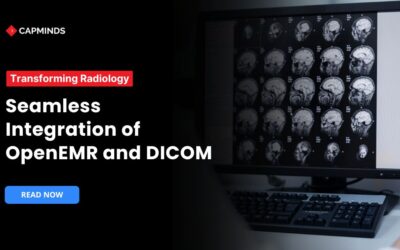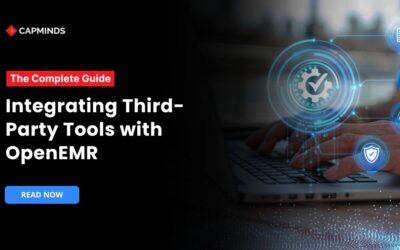How to Optimize Clinical Decision Support with OpenEMR’s AI-Powered Alerts & Reminders
Clinicians frequently face the difficult task of making timely and accurate decisions amid a pile of patient information. Even a dedicated physician, despite his expertise, can miss a critical drug interaction alert buried in a pile of notifications. It might lead to adverse patient outcomes. This creates the need for a more efficient clinical decision support system.
OpenEMR, an open-source electronic medical records system brings AI-powered alerts and reminders designed to enhance decision making. In this blog post, we have shared how OpenEMR’s AI-powered alerts & reminders improve clinical decision support.
Challenges in Clinical Decision Support
A clinical decision support system is designed to assist healthcare providers by offering timely information and alerts. However, it has many hidden challenges that significantly hinder its effectiveness. Here are some of the challenges included in CDS:
- Alert Fatigue: Clinicians often receive an overwhelming number of alerts. Most of them may be irrelevant or low priority. This constant overload could traumatize providers. Which ultimately leads to overlooking or dismissing critical warnings.
- Integration Issues: Seamless integration of CDSS into existing electronic health records and workflows is essential. However, poor integration can disrupt clinical processes, and cause inefficiency, and potential errors.
- User Resistance: Some healthcare providers may be hesitant to rely on CDSS due to concerns about accuracy, usability, or a perceived threat to their clinical autonomy. This distrust may limit the acceptance and successful usage of these systems.
Consequences of Inefficient Decision Support in Healthcare
When CDSS is not optimized, the consequences can be serious:
- Delayed Diagnoses: Inefficient systems can impede the diagnosis procedure. This causes therapy delays and hurts patient outcomes.
- Increased Cognitive Load: A large amount of non-essential warnings can be a burden for medical professionals. This can lead to burnout and increase the chance of errors.
- Patient Safety Risks: Missing or ignoring key notifications can lead to drug mistakes. Adverse drug interactions and other safety concerns jeopardize patient treatment.
How OpenEMR’s AI-Powered Alerts & Reminders Improve Clinical Decision Support
OpenEMR system has an existing Clinical decision support system that provides recommendations for providers based on medical data, clinical guidelines, and best practices to assist with the diagnosis.
However, the system’s flexibility enables the system to seamlessly integrate with an AI-powered CDS system to enhance its capability. OpenEMR addresses the CDS difficulties by utilizing artificial intelligence to deliver more targeted and effective support.
1. Real-time AI Alerts for Critical Decision-Making
One of the most known benefits of OpenEMR’s AI-powered technology is real-time alerting. It will tell healthcare providers about critical patient information that could influence treatment decisions. These warnings are intended to help in a variety of therapeutic circumstances.
- AI-powered notifications identify potential drug interactions, allergies, and contraindications. This ensures that prescribed medications do not negatively affect the patient’s health.
- OpenEMR may evaluate lab findings and send notifications for any unexpected readings that require immediate attention.
- AI monitors vital sign trends to detect deterioration before it becomes an emergency.
2. Smart Reminders for Preventive Care & Follow-Ups
Preventive care is a cornerstone of medicine. OpenEMR’s AI-powered reminders are critical in ensuring patients receive timely check-ups, screenings, and follow-ups. Compared to standard reminder systems, AI-enhanced reminders offer:
- OpenEMR utilizes AI to analyze a patient’s medical history and recommend appropriate screenings.
- Patients receive SMS, email, or app reminders to confirm or postpone their appointments.
- The system can remind clinicians to schedule cancer tests, immunizations, and yearly health checkups based on a patient’s demographics and medical history.
3. Personalized AI Insights for Clinicians
Modern medicine is moving toward precision healthcare. Treatment strategies are personalized to each patient. OpenEMR’s AI offers more than just basic notifications; it also provides individualized insights based on each patient’s unique medical history.
- OpenEMR can offer possible diagnoses based on patient symptoms, history, and test data, allowing clinicians to make informed decisions more quickly.
- AI assesses previous treatment outcomes for similar instances and recommends optimal treatment approaches based on best practices.
- Predictive analytics can help identify high-risk individuals who are likely to develop issues, allowing for early intervention.
4. Seamless Integration with OpenEMR Workflow
One of the main concerns about AI-powered healthcare products is the learning curve and interruption to existing workflows. OpenEMR’s AI-powered notifications and reminders integrate smoothly with the platform, ensuring:
- Because the AI capabilities are integrated into OpenEMR’s interface. Healthcare workers can utilize them naturally without requiring substantial training.
- The technology is intended to prevent alert fatigue by screening out unnecessary notifications, ensuring that only vital and actionable warnings reach physicians.
- Providers can tailor notifications based on priority, specialty, and patient demographics to avoid unwanted disruptions.
Related: How AI-Powered Drug Interaction Alerts Enhance Patient Safety in OpenEMR
Real-World Impact of OpenEMR’s AI-Powered Alerts
Consider the instance of a healthcare facility that has adopted OpenEMR’s AI-powered notifications. Within months, the hospital reported a significant reduction in medication mistakes and greater adherence to preventative care guidelines.
Clinicians reported that the system’s focused notifications lowered their cognitive strain.
How to Implement AI-Powered Alerts & Reminders in OpenEMR
Implementing these powerful AI functionalities in OpenEMR requires several critical steps:
- System Configuration: Make sure the AI modules are properly installed and configured within the OpenEMR system.
- Customize Alerts: Adjust the alert settings to meet the individual needs of your practice, concentrating on the most important clinical standards.
- Training: Provide comprehensive training to employees to familiarize them with the new features and encourage acceptance.
- Continuous Monitoring: Evaluate the system’s performance regularly and make any necessary improvements to improve its efficacy.
By following these steps, healthcare providers can fully utilize OpenEMR’s AI-powered alerts and reminders. This resulted in better clinical decision support and patient care.
CapMinds’ OpenEMR Customization and Integration Service
CapMinds empowers clinicians with advanced OpenEMR customization and seamless integration, optimizing workflows for greater efficiency and precision.
With AI-powered features, our solutions enhance patient safety by integrating real-time drug interaction alerts, reducing the risks of medication errors, and improving clinical decision-making.
By combining intelligent patient record management with automated reminders and AI-driven alerts, OpenEMR helps providers make faster, data-backed decisions, leading to improved patient outcomes and quality of care.
At CapMinds, our OpenEMR custom solutions are meticulously developed to match your practice’s unique needs with cutting-edge AI capabilities. Our services ensure:
- Low-cost, long-term budget-friendly solutions tailored to your practice’s growth.
- Secure data management & full compliance with HIPAA and industry regulations.
- AI-enhanced features for drug interaction alerts, predictive analytics, and automated workflows.
- Custom integrations for billing, reports, e-prescriptions, cloud storage, and clearinghouse support.
Get a modernized, AI-driven, and fully compliant OpenEMR system from CapMinds, ensuring patient safety, efficiency, and innovation in your healthcare practice.
“Partner with CapMinds for the most advanced, secure, and AI-powered OpenEMR solutions tailored for your success.”




